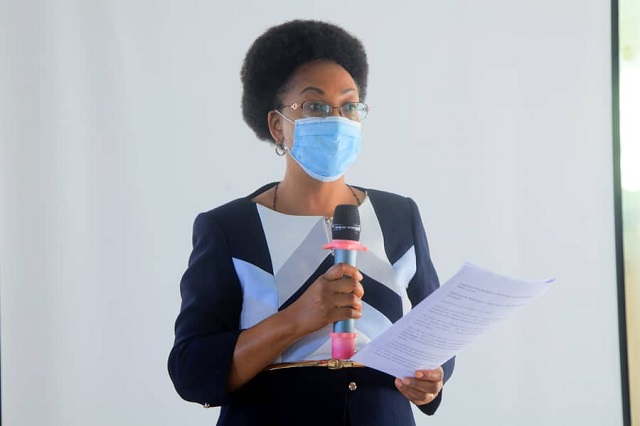
Kampala, Uganda | THE INDEPENDENT | The annual review of the public service sector was dominated by issues of salary enhancements, delayed payments, and corruption mainly in the recruitment processes. The sector reviews are aimed at presenting to the public the level of successes or failures by each, as far as meeting the commitments made by the NRM government in its manifesto.
The Ministry of Public Service outlined its achievements so far this year, including salary enhancements, rationalisation of government ministries, departments, and agencies, as well as the mechanisms being put in place or implemented to fight corruption. Mary Mugasa, the State Minister for Public Service admitted that there is a lot of corruption in the recruitment exercises, including solicitation for and payment of money by the recruitment officials and the job seekers respectively.
She said most of the corruption incidents happen at the District Service Commissions during the recruitment exercises. Unfortunately, according to her, investigations collapse because the whistleblowers usually shy away from giving further information or testifying against the suspects, which then kills the prosecution.
Mugasa said another form of corruption takes place at the local government levels when they refuse to declare to the DSC vacant positions, allegedly preserving them for relatives of the commission officials. This qualifies the reports that failure to fill vacancies is due to the inability of the districts to attract qualified candidates for the jobs as well as the lack of money to sustain the staff.
Instead, she says, a tour of districts has shown that many people are in acting capacity as the district heads wait for their relatives who are still in school. Others, she says reserve positions for carders from the district, which Mugasa says is unfair when qualified candidates are denied jobs because they hail from other places.
She was responding to a complaint presented by Willis Bashasha, the Director Manifesto Implementation Unit in the President’s office that some districts were failing to attract the needed officials, perhaps because of the poor resources. He had suggested that the position and recruitment for them ne recentralised. He also wondered who was in charge of ensuring discipline among the DSC officials.
Apollo Ruyonga from the State House Anti-corruption Unit called on the ministry and other agencies to always report suspected corruption cases to the unit or the Inspectorate of Government.
The ministry says in its sector report that on corruption, they have carried out a pay reform and continued with salary enhancements to remove injustices and address the compression ratio in salary scales. Cabinet approved a 2017 public service pay policy as well as a five-year pay plan covering every person who was paid salaries or allowances from the consolidated fund or out of money appropriated by Parliament.
“Implementation commenced in the financial year 2018/2019 and by 2022/2023 2.035 trillion has been committed to implementing the pay policy albeit the global effect of the COVID-19 Pandemic,” it says. The government adopted a phased approach/strategy to implement the approved pay plans due to the significant financial implication the policy presents in the Medium-term.
The priority for the last five years focused on employee categories that are critical for achieving the goal of industrialization, value addition, economic recovery, provision of critical care as well as peace and security. Bashasha said the phased implementation of the enhancements of salaries was causing discomfort and anxiety among other public servants.
Permanent Secretary Catherine Bitarakwate said the delays in salaries are mainly at the departments, agencies, or local governments because the Ministry of Finance has been disbursing salaries and allowances on time. She said that that is also the reason why some sectors have longer arrears than others because some are slower at processing the processes than others.
On the complaint by ICT teachers that they have been left out of the enhancements plans despite being science teachers, Bitarakwate said they were not included because even before the time the policy was made, they were not being paid as scientists or teachers of science. She, however, said that this could be corrected.
As of July 2022, 59,675 public officers excluding the Uganda Peoples Defence Forces, accounting for 18.5 percent have received enhancement by a minimum of 77 percent of the approved long-term pay targets while 262,675 employees accounting for 72.5 percent have not yet got enhancements.
According to the ministry paper, Central Appointing Commissions, legal officers under the Directorate of Public Prosecutions, Vice Chancellors, Deputy Vice Chancellors, Professors, Associate Professors, Scientists in the mainstream Public Service, Health Professionals, Science Teachers in Secondary Schools and Science Instructors, Tutors and Lecturers in BTVET Institutions have been enhanced at 100 percent of the approved pay targets.
Senior Officers of the Uganda People Defense Forces and Generals as well as Teaching and Non-Teaching Staff of Public Universities, other legal professionals other than those in the Judiciary Service and the Directorate of Public Prosecutions, and Deputy Permanent Secretaries and equivalent levels have been enhanced at 77 percent of the approved pay targets over the five years period.
Other Public Officers who benefitted within the five years period are Post-Primary Teachers, Instructors, Tutors, Headteachers, and their deputies. Others are Principals and their deputies Local Government Political Leaders, Chairpersons of District Service Commissions, personnel in Police, Prisons, and Uganda People’s Defense Forces in the ranks of Private to Sergeant and Staff of Public Universities.
*****
URN
 The Independent Uganda: You get the Truth we Pay the Price
The Independent Uganda: You get the Truth we Pay the Price



